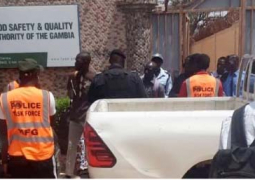
The capacity building forum, underway at a local hotel in Bijilo, is being hosted by the Department of Livestock Services under the Ministry of Agriculture.
It is designed to equip the participants on extrapolation and value chain analysis to enable them to identify best policy options for development.
Dr Babucarr Jaw, a programme coordinator at AU-IBAR, said the training is part of its mandate of exploring practical strategies to assist member states and regional economic communities to sustainably manage their animal resources.
He said the main approach to implementing the strategy was to mobilise technical and financial resources to undertake interventions aimed at addressing the challenges facing animal resources development in Africa.
Dr Jaw said the workshop would enable AU-IBAR to critically reflect on participatory and inclusive policy development processes using the ex-ante tool for ranking policy alternatives.
The director general of the [Gambia] Department of Livestock Services, Dr Duto Fofana, said the role and importance of the livestock sector had been well-recognised in the national and sectoral policy frameworks of The Gambia.
He said the sector accounts for 29.6 per cent of the agricultural gross domestic product (GDP) and 8.6 per cent of the national GDP.
Dr Fofana said a comprehensive programme for planning, implementing, monitoring and evaluation of livestock development programmes in The Gambia would further bring about changes in the means and methods of addressing challenges in the livestock sub-sector.
He said the livestock sector policy objectives within the agriculture and natural resources framework include improving livestock production and productivity to meet at least 75 per cent of national demands in meat products and 25 per cent of milk products.
The director general of the Department of Livestock Services said promoting comprehensive livestock products and putting enforcing guidelines and regulations would ensure the sustainable management of the country’s natural resources base.


